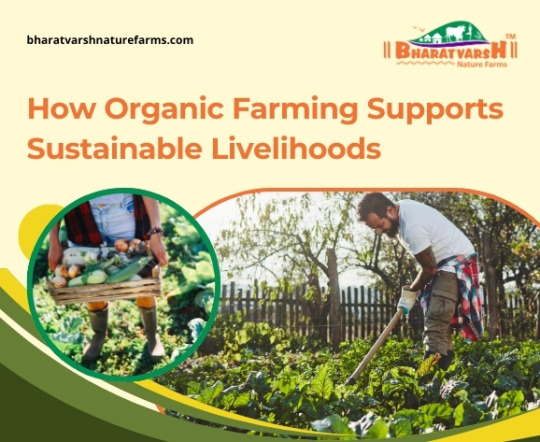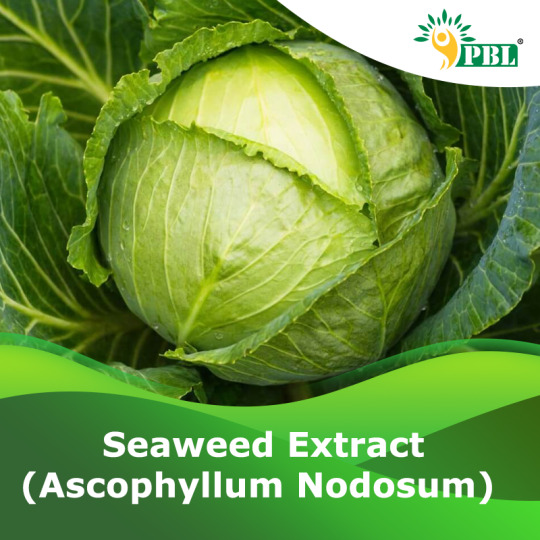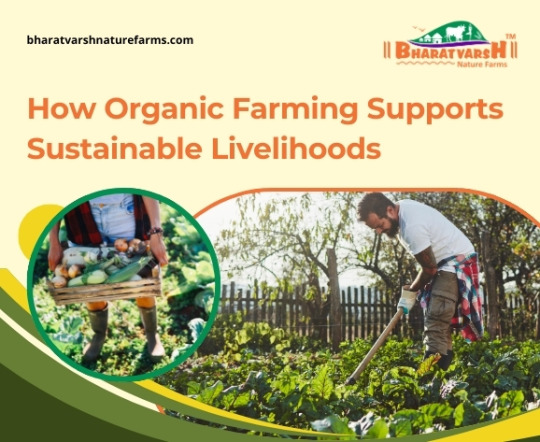#Sustainable farming practices
Explore tagged Tumblr posts
Text
1,300 Kenyan Farmers Graduate After Four Years of First-of-its-Kind Sustainable Agroforestry and Climate Action Training Program
Discover how over 1,300 farmers in Homa Bay, Kenya, are transforming their livelihoods and restoring the environment through Trees for the Future’s Forest Garden Program, a sustainable agroforestry initiative. Learn how agroforestry techniques like composting, crop rotation, and tree planting are empowering farmers in Kenya to combat climate change, increase food security, and boost…
#agroforestry in Kenya#agroforestry income generation#agroforestry projects#biodiversity conservation#biodiversity enhancement#carbon offset projects#carbon sequestration#climate change Solutions#composting techniques#crop rotation#crop yields#deforestation reversal#entrepreneurial farming#environmental sustainability#farmer training#farmer-to-farmer learning#Food security#Forest Garden Program#green jobs in agriculture.#Homa Bay agroforestry#integrated pest management#reforestation#smallholder farmers#soil carbon improvements#soil restoration#Sustainable agroforestry#sustainable farming practices#tree biomass#tree planting#women in agriculture
8 notes
·
View notes
Text
The Critical Role of Mancozeb in Global Agricultural Sustainability and Food Security

Prepared for Policymakers By the Center of Excellence in Regulatory Science in Agriculture (CERSA), NC State University, in partnership with UPL, and our Mancozeb Summit stakeholders (June 3-4, 2025, in the U.K.) Introduction The ongoing court process regarding the renewal of approval of the broad-spectrum fungicide mancozeb in the European Union (EU) comes at a critical juncture for global agriculture. Recent breakout sessions organized by the Center of Excellence in Regulatory Science in Agriculture (CERSA) at NC State University, in collaboration with UPL, convened international experts on potato, banana, soybean, and citrus production to discuss the significance of mancozeb for production of their respective crops. These sessions underscored the multifaceted importance of mancozeb across diverse crops, geographies, and socio-economic contexts. This paper summarizes the key findings and urges policymakers to consider the scientific, economic, and social implications of restricting access to this vital fungicide.
#Agriculture Solutions for Farmers#Sustainable Farming Practices#Sustainable Agriculture#Agricultural Research and Development#Environmental Stewardship
0 notes
Text

Explore how organic farming supports sustainable livelihoods, promoting eco-friendly practices, healthy communities, long-term agricultural success.
Do Visit: https://bharatvarshnaturefarms.com/how-organic-farming-supports-livelihood/
#Organic farming and livelihood#Sustainable farming practices#Organic agriculture benefits#Economic impact of organic farming#Rural livelihoods and farming#Organic farming for small farmers#Job creation in organic agriculture#Sustainable livelihoods in farming#Organic farming and rural economy#Empowering farmers through organic methods
1 note
·
View note
Link
Discover what is hydroponics and how it revolutionizes sustainable agriculture with soil-free gardening techniques. Learn how nutrient-rich water solutions can enhance plant growth and optimize resources.
0 notes
Text

#deckle edge paper#hand marbled paper#sustainable farming practices#handmade paper gift#Marble print paper#Handmade paper Manufacturar#Worldwide service#Handmade Make by pure Trees#Handmade paper Print on demand#Kalpna Company Manufacturar#Handmade service available#handmade paper#Dackle paper#handmade craft paper flowers#Moon Rock paper#Marble Paper#Deckle paper#Kalpana Handmade Paper#Most viral paper#Handmade Manufacturara Handmade paper#My Near HandMade paper
0 notes
Text
Patamda's Red Gold: Tomatoes Shine in National Market
Local produce gains fame, farmers seek infrastructure boost East Singhbhum’s agricultural prowess comes to the forefront as its tomatoes capture attention across multiple states. JAMSHEDPUR – The tomato production in the East Singhbhum district, especially from Patamda and Bodam blocks, is gaining increasing attention in markets across the country. Tomatoes from East Singhbhum, lately, have…
#Agricultural infrastructure needs#जनजीवन#Black cotton soil farming#Cold storage facilities Jharkhand#East Singhbhum agriculture#Farmer challenges India#Life#One District One Product scheme#Patamda tomatoes#Rural economic development#sustainable farming practices#Tomato market demand
0 notes
Text
Agricultural Activator Adjuvants: Enhancing Efficiency and Sustainability
Outline of the Article
Introduction to Agricultural Activator Adjuvants
What are agricultural activator adjuvants?
Importance in modern agriculture.
Types of Agricultural Activator Adjuvants
Surfactants
Oils
Drift Control Agents
Compatibility Agents
Role and Benefits of Agricultural Activator Adjuvants
Enhancing pesticide efficacy
Improving plant uptake
Reducing pesticide drift
Ensuring compatibility with tank mixtures
Market Trends and Growth Drivers
Increasing adoption of precision farming techniques
Growing demand for sustainable agricultural practices
Rise in research and development activities
Key Players in the Agricultural Activator Adjuvants Market
Analysis of major companies and their market share
Overview of their product offerings and strategies
Regional Analysis
Market landscape in North America, Europe, Asia Pacific, and other regions
Factors influencing market growth in each region
Challenges and Restraints
Regulatory hurdles and compliance issues
Concerns regarding environmental impact
Future Outlook and Opportunities
Emerging trends and innovations
Potential for market expansion
Case Studies and Success Stories
Real-world applications of agricultural activator adjuvants
Impact on crop yield and farm profitability
Environmental Sustainability and Safety Considerations
Eco-friendly formulations
Risk mitigation strategies
Consumer Awareness and Education
Importance of educating farmers about adjuvant selection and usage
Promoting responsible stewardship practices
Industry Collaboration and Partnerships
Collaborative efforts between manufacturers, farmers, and regulatory bodies
Sharing best practices and knowledge exchange
Market Forecast and Analysis
Predictions for market growth and revenue projections
Factors influencing market dynamics in the forecast period
Investment Opportunities and Market Entry Strategies
Potential for new entrants
Investment avenues for existing players
Conclusion
Recap of key points
Summary of market outlook and recommendations for stakeholders
Agriculture, the backbone of our civilization, continually evolves with technology and innovation. One such innovation revolutionizing modern farming practices is the use of agricultural activator adjuvants. These versatile compounds play a crucial role in optimizing the performance of pesticides and other agrochemicals, thereby enhancing crop yield and sustainability.
What are Agricultural Activator Adjuvants?
Agricultural activator adjuvants are additives formulated to improve the efficacy and performance of pesticides, herbicides, and fertilizers. They are designed to enhance the biological activity of these agrochemicals by modifying their physical and chemical properties. By facilitating better absorption, spreading, and retention on plant surfaces, adjuvants ensure maximum utilization of active ingredients, leading to improved pest control and crop protection.
Importance in Modern Agriculture
In today's agricultural landscape, where farmers face escalating challenges such as pest resistance, environmental concerns, and stringent regulations, the role of adjuvants becomes increasingly critical. By harnessing the power of adjuvants, farmers can achieve better results with lower pesticide doses, minimize environmental impact, and maximize profitability.
Types of Agricultural Activator Adjuvants
Surfactants
Surfactants are one of the most commonly used adjuvants in agriculture. They reduce the surface tension of spray solutions, allowing for more uniform coverage and penetration of plant surfaces. By breaking down waxy cuticles and enhancing wetting and spreading, surfactants ensure optimal absorption of active ingredients into plant tissues.
Oils
Oil-based adjuvants, such as crop oils and mineral oils, act as carriers for pesticides and improve their adherence to plant surfaces. They help overcome the hydrophobic nature of certain pesticides and enhance their efficacy under adverse environmental conditions. Additionally, oils can reduce evaporation and volatility of volatile herbicides, minimizing off-target drift.
Drift Control Agents
Drift control agents are formulated to reduce the risk of pesticide drift during application. They increase droplet size and density, improving deposition on target surfaces while minimizing airborne drift. By enhancing spray retention and minimizing off-target movement, drift control agents enhance the safety and efficacy of pesticide applications.
Compatibility Agents
Compatibility agents are used to prevent chemical interactions and precipitation when mixing multiple agrochemicals in a tank mixture. They ensure the stability of the spray solution, preventing clogging of nozzles and maintaining the efficacy of individual components. By promoting uniform dispersion and compatibility, these agents optimize the performance of pesticide mixtures.
Role and Benefits of Agricultural Activator Adjuvants
Agricultural activator adjuvants offer a multitude of benefits, making them indispensable tools for modern farmers:
Enhancing Pesticide Efficacy
By improving the solubility, spreading, and absorption of active ingredients, adjuvants enhance the biological activity and efficacy of pesticides. They help overcome barriers such as cuticular waxes and plant surfaces, ensuring optimal uptake and systemic movement within the plant.
Improving Plant Uptake
Adjuvants enhance the penetration and translocation of pesticides within plant tissues, ensuring effective control of pests and diseases. By facilitating rapid absorption and systemic movement, they maximize the bioavailability of active ingredients, leading to superior pest management and crop protection.
Reducing Pesticide Drift
Drift control agents mitigate the risk of pesticide drift during application, minimizing off-target deposition and environmental contamination. By optimizing droplet size and distribution, these adjuvants ensure precise delivery of pesticides to target areas while reducing the potential for environmental impact.
Ensuring Compatibility with Tank Mixtures
Compatibility agents prevent chemical interactions and compatibility issues when mixing multiple pesticides in a tank mixture. They maintain the stability and integrity of the spray solution, preventing precipitation and clogging of spray equipment. By promoting uniform dispersion and compatibility, these adjuvants maximize the efficacy of tank mixtures and minimize the risk of equipment malfunction.
Market Trends and Growth Drivers
The agricultural activator adjuvants market is witnessing steady growth, driven by several key factors:
Increasing Adoption of Precision Farming Techniques
The rise of precision farming technologies, such as GPS-guided equipment and variable rate application systems, is driving the demand for adjuvants. These technologies enable farmers to optimize pesticide applications and maximize crop yield while minimizing input costs and environmental impact.
Growing Demand for Sustainable Agricultural Practices
With increasing consumer awareness and regulatory pressure, there is a growing demand for sustainable agricultural practices. Adjuvants play a crucial role in supporting sustainable farming by improving the efficiency and efficacy of pesticide applications, reducing chemical usage, and minimizing environmental footprint.
Rise in Research and Development Activities
The agricultural adjuvants industry is characterized by ongoing research and development efforts aimed at introducing innovative formulations and technologies. Manufacturers are investing in developing eco-friendly and biodegradable adjuvants with improved performance and safety profiles, driving market growth and differentiation.
Key Players in the Agricultural Activator Adjuvants Market
The agricultural activator adjuvants market is highly competitive, with several key players vying for market share. Some of the leading companies in the industry include:
Company A: A global leader in agricultural adjuvants, offering a comprehensive portfolio of surfactants, oils, and drift control agents.
Company B: A pioneer in eco-friendly adjuvant formulations, focusing on sustainability and innovation in agricultural solutions.
Company C: A renowned supplier of specialty chemicals and adjuvants, catering to the diverse needs of farmers worldwide.
Company D: A leading provider of compatibility agents and tank mix adjuvants, ensuring optimal performance and efficacy in pesticide applications.
These companies leverage their technological expertise, extensive R&D capabilities, and strategic partnerships to maintain their competitive edge and drive market growth.
Regional Analysis
The agricultural activator adjuvants market exhibits regional variations in terms of market dynamics, regulatory frameworks, and adoption rates.
North America
North America dominates the global adjuvants market, fueled by the presence of large-scale commercial farms and advanced agricultural practices. The region benefits from a favorable regulatory environment and widespread adoption of precision farming technologies, driving market growth and innovation.
Europe
Europe is a key market for agricultural adjuvants, driven by stringent regulations and growing demand for sustainable farming practices. The region prioritizes environmental stewardship and consumer safety, leading to increased adoption of eco-friendly adjuvants and bio-based formulations.
Asia Pacific
Asia Pacific represents a lucrative market for agricultural adjuvants, driven by the expanding agricultural sector and rising demand for high-quality crops. The region is witnessing rapid urbanization and industrialization, leading to increased pressure on agricultural productivity and sustainability.
Other Regions
Other regions, such as Latin America, Africa, and the Middle East, offer significant growth opportunities for agricultural adjuvants. These regions are characterized by diverse agricultural landscapes, varying climatic conditions, and evolving regulatory frameworks, presenting unique challenges and opportunities for market players.
Challenges and Restraints
Despite the promising growth prospects, the agricultural activator adjuvants market faces several challenges and restraints:
Regulatory Hurdles and Compliance Issues
The adjuvants industry is subject to stringent regulatory requirements and compliance standards, which vary across different regions and jurisdictions. Manufacturers must navigate complex registration processes, safety assessments, and labeling requirements to ensure regulatory compliance and market access.
Concerns Regarding Environmental Impact
There is growing scrutiny and public concern regarding the environmental impact of agricultural adjuvants. Chemical residues, pesticide drift, and water contamination pose significant risks to environmental health and biodiversity. Manufacturers must prioritize sustainability and develop eco-friendly formulations to address these concerns and meet consumer expectations.
Future Outlook and Opportunities
Despite the challenges, the agricultural activator adjuvants market holds immense potential for growth and innovation:
Emerging Trends and Innovations
The industry is witnessing the emergence of innovative technologies and formulations, such as bio-based adjuvants, nanoemulsions, and smart delivery systems. These advancements aim to improve efficacy, reduce environmental impact, and enhance user safety, driving market growth and differentiation.
Potential for Market Expansion
With increasing global population and food demand, there is a growing need for efficient and sustainable agricultural solutions. Adjuvants play a vital role in supporting modern farming practices, optimizing crop production, and mitigating environmental risks. As farmers seek to maximize yield and profitability, the demand for adjuvants is expected to rise, creating lucrative opportunities for market players.
Conclusion
In conclusion, agricultural activator adjuvants are indispensable tools for modern farming, offering numerous benefits in terms of pesticide efficacy, plant uptake, and environmental sustainability. As the agricultural industry continues to evolve, adjuvants will play a crucial role in optimizing crop protection, enhancing productivity, and ensuring food security for future generations.
FAQs (Frequently Asked Questions)
What are agricultural activator adjuvants? Agricultural activator adjuvants are additives formulated to enhance the performance and efficacy of pesticides, herbicides, and fertilizers by modifying their physical and chemical properties.
How do adjuvants improve pesticide efficacy? Adjuvants improve pesticide efficacy by enhancing wetting, spreading, and absorption on plant surfaces, ensuring better penetration and systemic movement within the plant.
What types of adjuvants are commonly used in agriculture? Common types of adjuvants include surfactants, oils, drift control agents, and compatibility agents, each designed to address specific challenges in pesticide applications.
Why are adjuvants important in modern agriculture? Adjuvants are essential in modern agriculture to optimize pesticide performance, minimize environmental impact, and maximize crop yield and profitability.
Are there any environmental concerns associated with adjuvant usage? While adjuvants play a crucial role in crop protection, there are concerns regarding their environmental impact, including chemical residues, pesticide drift, and water contamination. Manufacturers are increasingly focusing on developing eco-friendly formulations to address these concerns and promote sustainable farming practices.
#Agricultural activator adjuvants#Adjuvants in agriculture#Pesticide adjuvants#Crop protection additives#Surfactants for farming#Oilbased adjuvants#Drift control agents#Compatibility agents for pesticides#Sustainable farming practices#Precision agriculture solutions#Environmental stewardship in agriculture#Agricultural chemical formulations#Market trends in agrochemicals#Farming innovations#Crop yield optimization
0 notes
Text
The Impact of Your Food Choices on The Environment
More and more people are becoming aware of the impact their actions have on the environment. One area where our choices can make a significant difference is in our food consumption. The food we eat not only affects our health but also has a profound impact on the environment. As environmentally conscious individuals who value sustainable and organic farming practices, we have the power to make a…
View On WordPress
#Deforestation and Habitat Destruction#Food Waste and Packaging#Local producers#Organic farming practices#Reducing consumption of animal-based products#Soil Degradation and Loss#supporting local businesses#Sustainable farming practices#The Carbon Footprint of Food Production#Water Consumption and Pollution
0 notes
Text
SEAWEED FERTILIZER BENEFITS MANUFACTURER & SUPPLIER | BEST PRICE AVAILABLE - PBL
Peptech Bio is a reliable and cost-effective manufacturer and supplier of seaweed fertilizer. Seaweed fertilizer is a nutrient-rich and eco-friendly solution that can help promote plant growth, aid in disease resistance, and contribute to healthier crops. It enhances soil structure, microbial activity, and fertility, making it ideal for a variety of crops. The appropriate use of seaweed fertilizer can lead to improved crop quality, higher yields, and sustainable farming practices.

#Peptech Bio#seaweed fertilizer#reliable manufacturer#cost-effective supplier#plant growth#disease resistance#sustainable farming practices#eco-friendly solution#higher yields
0 notes
Text

just salmon things
#sorry im in my drawing skizzleman as various animals era. i do not plan to stop <3#anyway stream lofi crispwave beats to sustainable farm salmon to by the garages#yes that is an actual song and it is indeed a lofi crispwave beat about sustainable salmon farming practices#my art#hermitcraft#skizzleman#big salmon
690 notes
·
View notes
Text
How Climate Change is Reshaping Farming in Kenya’s Nyandarua and Laikipia Counties
Discover how climate change is reshaping farming in Nyandarua and Laikipia Counties. Learn how farmers are adapting with intercropping, staggered planting, and drought-resistant crops to combat unpredictable weather. Kenyan farmers are abandoning traditional planting calendars due to erratic rainfall. Find out how this shift impacts food security, pest control, and local agricultural trade in…
#agricultural adaptation#agricultural input supply#climate change in Kenya#climate-smart farming#crop diversification#drought impact on farming#Drought-resistant crops#food security in Kenya.#intercropping maize and beans#kenyan farmers#Laikipia agriculture#Nyandarua farming#pest management challenges#staggered planting#sustainable farming practices#unpredictable rainfall
0 notes
Text
where my foodie xander harris truthers at? like, xander who gets some money and becomes an adult with an adult's palate and metabolism and moves someplace that isnt a bumfuck town in the middle nowhere, like a city that has restaurants with michelin stars
he can still murder a family-sized bag of doritos and he still likes taco bell, okay? but he appreciates rack of lamb now, and fig and goat's cheese pizza, and little fussy apps that you can pop in your mouth. he drinks craft beer and expensive cocktails with funny names. idk. miss me with your classism and fatphobia when it comes to xander
#you know what i'm gonna make a controversial decision on tenderjock's blog and i'm gonna tag this post with a char tag#xander harris#it's terribly simple#food mention#its just that the comics have him living in sf apparently. i think thats wrong i think he lives in alameda. but whatever#i know 100 guys born in the 1980s who are exactly this guy that i'm describing. goofy contractor never been to real college#beer snob burger snob will talk your ear off about sustainable farming practices that they barely understand whilst eating an entire#platter of salmon roe on crackers. and they all live in the bay area
15 notes
·
View notes
Text
How Organic Farming Supports Sustainable Livelihoods

In an era where sustainability and environmental consciousness are at the forefront, organic farming has emerged as a vital practice for promoting sustainable livelihoods. By emphasizing natural processes and minimizing the use of synthetic inputs, organic farming not only enhances food security but also supports the well-being of farmers and the environment. In this comprehensive blog post, we will explore the Organic Farming Benefits, the importance of Sustainable Farming, and how Organic Farming Livelihoods contribute to a healthier planet and more resilient communities. Bharatvarsh Nature Farms is a prime example of how embracing organic agriculture can lead to significant positive outcomes.
What is Organic Farming?
Organic farming is a method of agriculture that relies on natural inputs and processes to grow crops and raise livestock. It avoids the use of synthetic fertilizers, pesticides, genetically modified organisms (GMOs), and other artificial additives. Instead, it emphasizes the use of organic fertilizers, crop rotation, composting, and biological pest control. The goal is to create a self-sustaining, balanced ecosystem that promotes biodiversity and soil health.
Organic Farming Benefits for the Environment
Enhanced Soil Fertility
One of the key Benefits of Organic Farming is the enhancement of soil fertility. By using organic fertilizers and compost, farmers can improve soil structure, increase nutrient content, and promote beneficial microbial activity. This leads to healthier, more productive soil that can sustain crops for generations.
Reduced Pollution and Chemical Use
Eco-friendly farming practices minimize the use of harmful chemicals, reducing pollution of water bodies, soil, and air. This not only protects the environment but also safeguards the health of farm workers and nearby communities.
Biodiversity Conservation
Organic Agriculture supports biodiversity by creating habitats for various plant and animal species. The avoidance of synthetic chemicals allows natural ecosystems to thrive, promoting a balanced and resilient environment.
Organic Farming Benefits for Farmers
Improved Health and Safety
Farmers who practice Sustainable Farming enjoy improved health and safety due to reduced exposure to toxic chemicals. Organic farming methods eliminate the need for hazardous pesticides and herbicides, creating a safer working environment.
Economic Viability
Organic Farming Livelihoods are often more economically viable in the long term. By reducing dependency on expensive synthetic inputs and focusing on sustainable practices, farmers can lower production costs and increase profitability. Additionally, the growing demand for organic products can lead to higher market prices and better income opportunities.
Empowerment and Knowledge Sharing
Organic Farming Practices empower farmers by promoting knowledge-sharing and collaboration. Farmers learn about sustainable techniques, soil health management, and biodiversity conservation, enhancing their skills and capabilities. This collective knowledge contributes to stronger, more resilient farming communities.
Continue Reading: https://bharatvarshnaturefarms.com/how-organic-farming-supports-livelihood/
#Organic farming and livelihood#Sustainable farming practices#Organic agriculture benefits#Economic impact of organic farming#Rural livelihoods and farming#Organic farming for small farmers#Job creation in organic agriculture#Sustainable livelihoods in farming#Organic farming and rural economy#Empowering farmers through organic methods
1 note
·
View note
Text
The Prince of Wales Visits Duchy Focus Farm In Hereford To Explore The Future Of Farming On The Road To Net Zero










Prince William during a visit to Lower Blakemere Farm, a Duchy Focus Farm in Hereford, to learn more about how the multigenerational farm has refined regenerative farming practices and farm diversification as part of its journey to net zero on 28 January 2025 in Hereford, England.
Lower Blakemere Farm is one of the Duchy of Cornwall's seven Focus Farms, an initiative designed to share knowledge and experiences of the transition to greener farming practices.
📸: Jacob King - WPA Pool / Getty Images
#prince william#prince of wales#british royal family#Lower Blakemere Farm#Duchy Focus Farm#Duchy of Cornwall#Focus Farms#Hereford#regenerative farming practices#farm diversification#net zero#farming#sustainability#greener farming practices
8 notes
·
View notes
